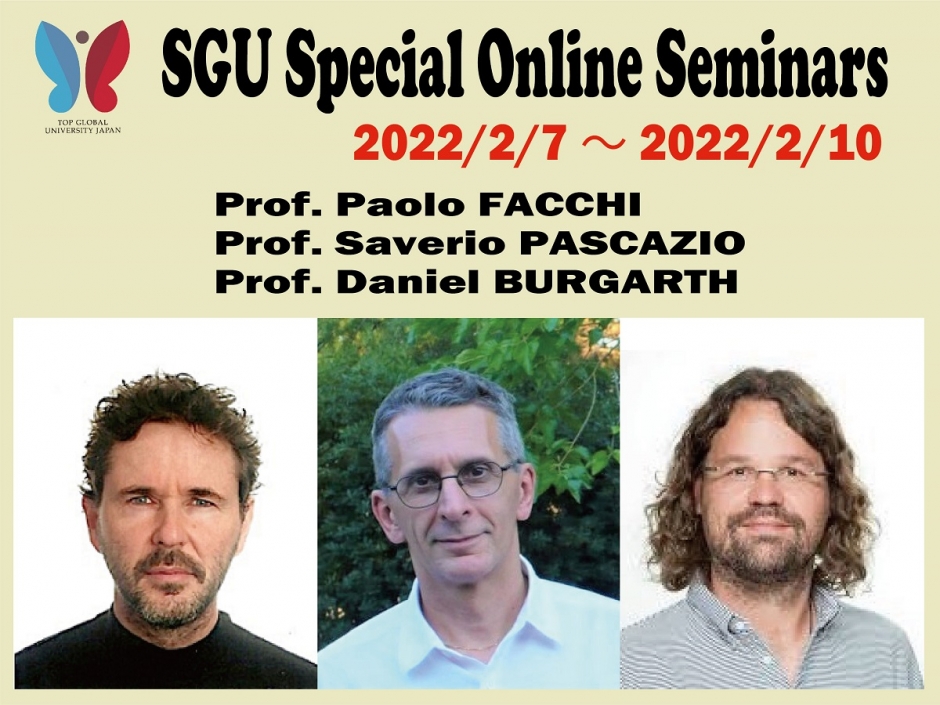- ニュース
- SGU Special Online Seminars on Quantum Physics
SGU Special Online Seminars on Quantum Physics

Dates
カレンダーに追加0207
MON 20220208
TUE 20220210
THU 2022- Place
- Zoomによるオンライン開催
- Posted
- 2022年2月8日(火)
早稲田大学スーパーグローバル大学創成支援事業 数物系科学拠点では『量子物理学特別講義』としてSGU Special Online Seminarsをオンライン(ZOOM)で開催致します。
【日程】 2022年2月7日(月) 2月8日(火) 2月10日(木)
【時間】 17:00~19:00
【場所】 Zoomによるオンライン開催
【言語】 英語
【対象】 早稲田大学学部生、大学院生、教職員、
【費用】 不要
【事前登録】 必要
【問合せ】 先進理工学部 物理学科 湯浅 一哉教授 (yuasa(a)waseda.jp)
【Website】https://www.f.waseda.jp/yuasa/SGU2021.html
詳細
Speaker: Prof. Saverio PASCAZIO (University of Bari, Italy)
Date: February 7 Monday 17:00-19:00 Tokyo time
Title: Dimensional Reduction of Gauge Theories
Abstract:
We derive and discuss one- and two-dimensional models for classical electromagnetism by making use of Hadamard’s method of descent. Low-dimensional electromagnetism is conceived as a specialization of the higher dimensional one, in which the fields are uniform along the additional spatial directions. We then consider two-dimensional models for a charged spin-1/2 particle, both in the free case and in the presence of the electromagnetic field, by applying the same reduction technique. The basic properties of these theories, as well as their relation with existing models for two-dimensional matter, are discussed.
Speaker: Prof. Paolo FACCHI (University of Bari, Italy)
Date: February 8 Tuesday 17:00-19:00 Tokyo time
Title: Long-Time Stability of Perturbed Quantum Symmetries
Abstract:
We show that for any finite-dimensional quantum systems the conserved quantities can be characterized by their robustness to small perturbations: for fragile symmetries, small perturbations can lead to large deviations over long times, while for robust symmetries, their expectation values remain close to their initial values for all times. This is in analogy with the celebrated Kolmogorov-Arnold-Moser theorem in classical mechanics.
References:
D. Burgarth, P. Facchi, H. Nakazato, S. Pascazio, and K. Yuasa,
“Kolmogorov-Arnold-Moser Stability for Conserved Quantities in Finite-Dimensional Quantum Systems,” Phys. Rev. Lett. 126, 150401 (2021);
“Eternal Adiabaticity in Quantum Evolution,” Phys. Rev. A 103, 032214 (2021).
Speaker: Prof. Daniel BURGARTH (Macquarie University, Sydney)
Date: February 10 Thursday 17:00-19:00 Tokyo time
Title: Bounds for the Rotating Wave Approximation
Abstract:
The rotating wave approximation is a commonly used approximation in quantum physics. Often, it is taught in a very ad-hoc manner, without a proper justification. In this lecture I will give a gentle introduction to the subject and show how the quality of the approximation can be bounded.
